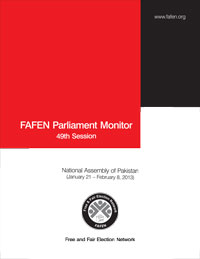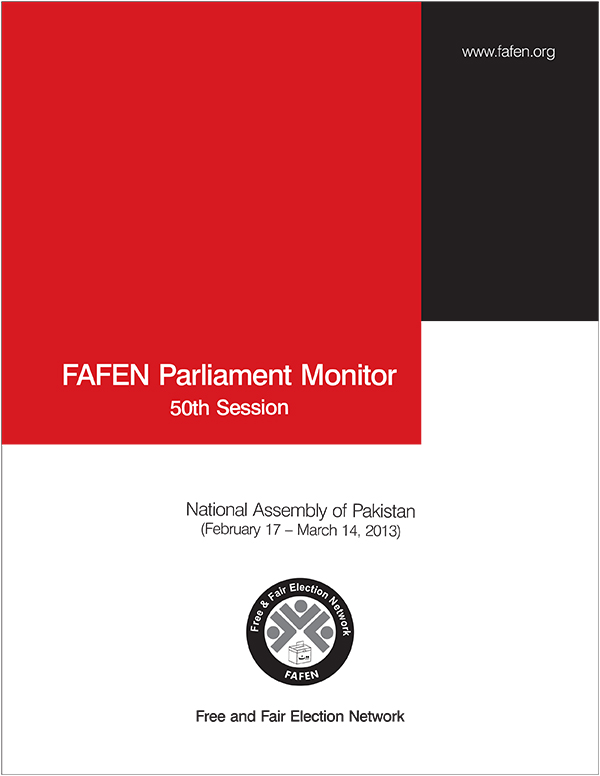Islamabad, February 15, 2013: Marked by passage of four education-related bills amid walkouts on the imposition of Governor’s rule in Balochistan and the debate over creation of new provinces, the 49th session of National Assembly witnessed a historic change in the rules of procedure allowing standing committees power to scrutinize ministerial budgetary proposals before made part of the federal budget.
Passed in the seventh sitting, under the amendment in rule 201 of the Rules of Procedure, “Each ministry shall submit its budgetary proposals relating to Public Sector Development Program (PSDP) for the next financial year to the relevant standing committee not later than the 31st January of preceding financial year and the standing committee shall make recommendations thereon not later than the 1st March of the preceding financial year.”
Interestingly in this session more private members’ bills – three – were passed than the government bills – one. The sole government bill passed during the session – the Islamabad Capital Territory Private Educational Institutions (Registration and Regulation) Bill 2012 – seeks to regularize private educational institutions in Islamabad. The three private members’ bills passed during the session called for establishing universities in Lahore and Islamabad, including a South Asian Strategic Stability Institute (University). Additionally, eight government and five private bills were introduced and sent to the relevant standing committees.
The session witnessed 18 walkouts consuming 557 minutes – 38% of the session time. Nearly half of the protests were staged by MMAP members over the imposition of Governor’s rule in Balochistan. Apart from recording their protests on the floor, legislators walked out of the house amid debate over creating new provinces. However, the debate over law and order and power shortages remained in the background.
The house left 66% agenda items listed on the orders of the day unaddressed as it witnessed low attendance and participation of legislators. The session addressed 34% of 160 agenda items – 75 private and 85 government – appearing on the orders of the day, including four bills, ten calling attention notices, a resolution, a privilege motion and a motion under rule 259. One resolution was introduced as supplementary agenda.
The session from January 21 to February 8, 2013 lasted a little more than 24 hours. All 12 sittings lasting an average two hours remained 52 minutes behind schedule. Members’ attendance remained low throughout the session. On average 59 (17%) members were present at the beginning, 48 (14%) at the end and a maximum 118 (35%) were present at any one point during each sitting. These figures are based on headcounts conducted by FAFEN observer since the National Assembly does not make attendance record of legislators’ public.
The Prime Minister and the Leader of the Opposition each attended a single sitting. The Speaker chaired
5% of the proceedings, the Deputy Speaker 51% while the remaining 44% of the session was presided over by members of Panel of Chairpersons. The parliamentary leaders also did not take an active part in the session.
On average parliamentary leaders attended three sittings during the session. However, attendance of chief whips was relatively better as they attended at least half of the sittings, with the exception of PMLF and MQM. Members’ participation was low. Only 23 members (7%) submitted agenda, 79 (23%) debated it and (43) 13% did both.
One of the 15 resolutions appearing on the orders of the day was unanimously adopted. Jointly moved by
Independents and PPPP, ANP, MQM lawmakers, the resolution called on the government to recognize the services of the provincial legislators killed in terrorists’ attacks in Karachi and Peshawar.
Ten standing committee reports were presented in the house during the session. Apart from the report of the Standing Committee on Rules of Procedure and Privileges which led to change in the rule 201 on budget process, the Public Accounts Committee presented a report on the refusal of the Supreme Court registrar to appear before the PAC. A commission on creating new provinces out of Punjab also presented its report in the house during the session.
As many as 569 questions – 234 starred and 335 unstarred – were asked by 52 legislators. A total of 392 questions were responded to by ministries as MNAs asked 70 supplementary questions.
The construction of housing societies on fertile agricultural land, shortage of petrol, Higher Education Commission’s expenditures, corruption by Federal Board of Revenue, unauthorized occupation of government quarters, outstanding loans and performance of Pakistan Steel Mills, and increase in electricity and gas tariffs were some of the issues highlighted through ten calling attention notices on which legislators received government assurances.
On 122 points of order, among other issues legislators expressed their views on the Governor’s rule in Balochistan and the creation of new provinces. Members’ speeches and the treasury’s rejoinders on points of order consumed 40% of the proceedings’ time.
FAFEN hopes this report will be a valuable contribution to creating both a more informed citizenry and an increasingly responsible Parliament.
For complete report click here



